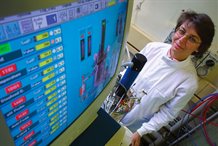Kiran Parmar, MEng Software Engineering - Business Analyst at CapGemini
Podcast transcript
Download the podcast (MP3, 4.06MB, opens new window)
KIRAN: Hi, my name is Kiran Parmar. I came from the University of Birmingham. Currently at CapGemini and my course was in software engineering, which was a Masters.
INT: What made you choose your Masters course in software engineering at Birmingham?
KIRAN: The main elements of that course that attracted me to the Birmingham University software engineering degree was the fact that you had a lot of options built into it. You could have a fourth year option, which you could do a Masters in. It also had the option of doing a year out as well in industry. Those are really the two key elements that attracted me to that course.
INT: Can you tell us a bit about how you got your job at CapGemini.
KIRAN: I started applying for a number of jobs and then went to the Career Centre to get some advice. That's when I found out about NEC Careers Fair, which was taking place in Birmingham. I went there and saw CapGemini. I started researching more into their company and decided I wanted to apply for their graduate scheme. I worked with the Career Centre with interview techniques and with my application as well. And then, went through the process of applying to CapGemini and got through their application process, which was, there was a first online application and then there was a telephone conversation, after which, you needed to go to the head office for an actual interview and then, I got accepted.
INT: What would you say made you stand out when you applied to CapGemini?
KIRAN: I think there are a number of things that made me stand out above and beyond the standard set of things that they require. Usually there are a lot of people that are applying that have an IT degree or related. So, the additional things that, at least, my company look at are, what other type of events or activities have you done outside of your academic life. Elements were that, I'd been running a web solutions company outside of being in university. So that really really helped. I did a lot of charity type work as well, where I was organising events and things like that. That helped build the sort of the characteristics as well that they were looking for. So, those are the type of elements that really added to my application.
INT: What does your job at CapGemini involve?
KIRAN: The job at CapGemini, while you are in the graduate scheme involves, effectively, being rotated on a number of roles. So, that could be testing or helping out in the project management teams or the number of variety of roles for you to get a lot of experience in. Whatever that type of role demands and what are the specific project demands, that's pretty much what you do. The idea of the graduate scheme is, you get rotated around all these different roles and gain the necessary skills that you need to. Eventually, once you've got the necessary skills and you have also picked a part of the company that you'd like to sort of transition into, after the graduate scheme finishes, which is, usually, between eighteen and 24 months then, you can move out into an actual full time role, permanent role. And that could be into a number of business units. My current one is the Business Analysis Unit, which is part of the software engineering group within CapGemini. What I do there, as a business analyst do process modelling, which involves facilitating workshops and things to define business processes. The other side of my job is also to define system requirements. That's really what I do at CapGemini.
INT: Would you say there are any skills that you learned whilst at university that you found transferrable to your job?
KIRAN: Definitely. While I was doing my four year Masters degree, effectively in the last two years of that degree, I was doing a lot of project type work, working within teams. While I was in those teams, usually my role was either coordinating or team leading. So those management type skills definitely transferred into me being in CapGemini, because now I currently do manage resources. The other things that I transferred were the kind of communication skills. I'll give an example where I really learned that at university: In my Masters year, which was my final year, I'd effectively go out to the teachers, which was where I needed to really set the requirements from for the system that I needed to build. So, there was a lot of direct contact, so I had to do a lot of interviewing and things, physically, with people. Gaining those communication skills I now use while in CapGemini. I think the other types of things I did transfer from my degree is the basic technical knowledge like, programming and the knowledge about how projects. Those are the type of things really that I transferred and moved out from my university degree into an industrial environment.
INT: Do you have any tips for current students on how to get the most out of university?
KIRAN: I think one of the things that I've definitely come across while I've been in industry is that, they really like people who have gained experience before they've actually made that application. Things like, internships or summer placements are really really useful, purely because they help you gain that experience. It's best that that experience is directed at the industry that you are applying at. I also think that, after you've taken your internship or summer placement and got that experience, it's useful to come back to your university degree and focus on the points that really matter in industry.
More video
